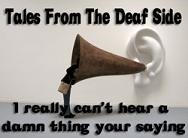Most of you know that tomorrow is the big day. At 9am tomorrow I will be the proud owner of snazzy new RIC digital hearing aids. It's been a long hard journey to get here. When I received my first set of hearing aids in my early 20's, I wasn't as ready as I should have been. I couldn't deny that my hearing was bad, but I wasn't ready for the mental and physical adjustment that came with wearing aids. I would get so frustrated by the audiological overload that soon I wore them less and less. I thought (despite the advice of my dr) that it would be an immediate fix. Of course it wasn't. That's why they are called "hearing aids" not "hearing cure". Only after Stella was born did I really begin to accept my hard of hearing status. To not beat myself up over my uncontrollable handicap. I realize now that having hearing aids will not only boost my confidence in social situations but It will ease the frustration of my loved ones as well. The next few weeks, hell months perhaps will be full of ups and downs. But I'm confident that soon I will take full advantage of my new ear gear.
Something I've been trying repeatedly to let some people know (especially Mom & Dad) is that this will not be a quick fix. I will not suddenly understand everything they are saying. I still need them to stick to the communication rules that apply now. What they and I can look forward to is less repetition and more acknowledgment when they call my name. My Voc Rehab counselor (it maddens me the most insurance companies, including Medicare will cover glasses but will not cover hearing aids) gave me this great little sheet advising a well hearing person how to better communicate with someone who is hard of hearing. It sums it all up so well. And I thought that this is certainly something I should share with you my family and loved ones.
1. Be sure to always face people who are hard-of-hearing, and if possible, get on the same level as them. This allows them to better understand you, because they have additional information about what you are saying. They will not only be able to focus and listen more efficiently, but will also have the opportunity to interpret your facial expressions, lip read, and speechread. All of these will be possible because they will be able to directly see your face.
2. Always be aware of the lighting in the room. It is best for the light to be shining in the speaker's face, rather than in the eyes of people who are hard-of-hearing. Having the light shine upon your face as the speaker will accentuate your facial features. This will allow them to read your expressions and lips more precisely. Never let the light shine in the eyes of people who are hard-of-hearing. They need to be able to see the person they are communicating with, and light in their face will most likely distract and inhibit them from using all of the clues and information available.
3. Be aware of the fact that even though the people who are hard-of-hearing may be able to hear you, your speech may sound distorted. Therefore, they may have trouble understanding some of the words that you say. Try to avoid becoming angry or frustrated with them, because it gets no one anywhere. It is good to be aware that they may not always fully understand you, so that when this does occur, you can prevent negative feelings.
4. Always talk to people who are hard-of-hearing in the same room as they are. You should never yell room to room, but if you absolutely must, tell them who you are and make sure that they have heard you.
5. Take into consideration that everyone has a decreased hearing ability and understands less when they are tired or sick.
6. Speak in a normal fashion but at a slightly slower pace. This will make your speech clearer. Do not shout, exaggerate, or string your words together too rapidly.
7. Keep objects out of your mouth and away from your face when talking, especially your hands. Anything that will obstruct the person's view of your face or the clarity of your speech will make you more difficult to understand
8. Rephrase your sentences rather than repeat them if the person has trouble understanding you. It is better to find a new way to say what you are trying to get across rather than to repeat the same confusing words multiple times.
9. Never speak too rapidly or use complex and long sentences. You should also always pause between sentences and phrases to allow people who are hard-of-hearing time to process what you have said and ask for clarification if necessary.
10. If you are giving people who are hard-of-hearing specific information such as time, place, price, or a telephone number, ask them to repeat it back to you to assure that they have correctly heard you. Many words and numbers sound very similar.
People that are hard-of-hearing may often become frustrated that they cannot understand what people around them are saying. It can also get very frustrating for their communication partners when they are trying to tell them something and cannot easily and effectively do so. Although these tips may seem simple, they can make a world of difference for both parties. Communication will be a much more satisfying process all around!
Wednesday, June 24, 2009
Better Late Than Never
Subscribe to:
Post Comments (Atom)







3 comments:
I need to print this out and hang it on the wall at home. In spite of my husband's own hearing loss, he is surprisingly short tempered when trying to communicate with our daughter, who has had ear/hearing issues since forever.
Are you going to show us a picture of them?
We need an update!
Post a Comment